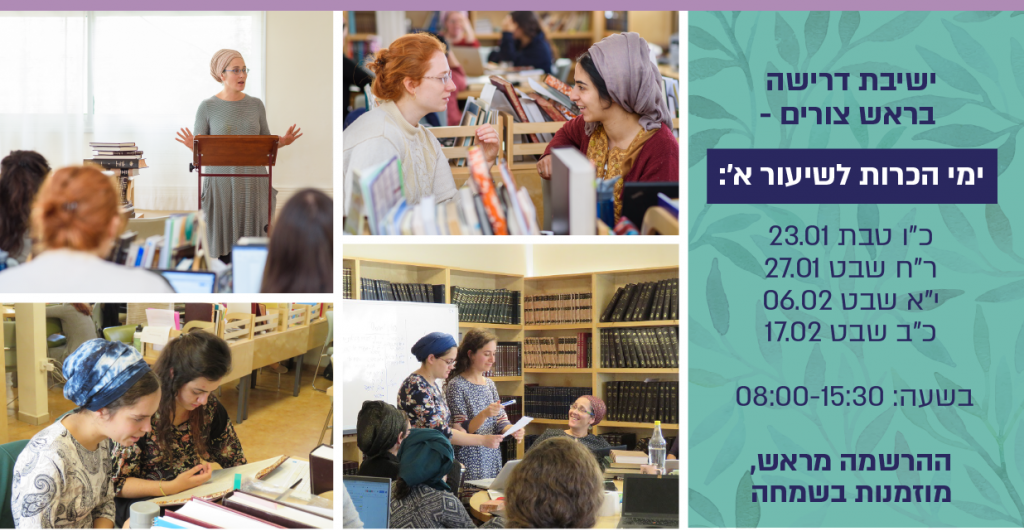Our Gefet series playlist has over 60 shiurim available on Youtube!
Divrei Torah by the Roshei Yeshiva of Yeshivat Drisha
כי מכפר עציון תצא תורה
Torat Drisha
Rosh Hashanah
Parashat Bereishit: Between the World and Hashem
"היום הרת עולם" - according a tradition in Chazal, Rosh Hashana is the day of the creation of the world, or more precisely: the day of the creation of man. I would like to briefly examine one question which arises through the story of Adam, who serves as the archetype of human sin, & raise different aspects in the teshuva process & in defining sin in our lives.
Parashat Bereishit: Between the World and Hashem
Rabbanit Hanna Godinger (Dreyfuss)
Read more
Chanukah
On Seeing the Chanukah Candles
Over the course of the pages in Masekhet Shabbat which deal with the holiday of Chanukah, the sugya on the middle of daf 23a comes to discuss the berakhah that one needs to make on lighting the Chanukiah. The sugya opens with a statement by Rav, who says: "המדליק נר של חנוכה צריך לברך."
On Seeing the Chanukah Candles
Rabbanit Hanna Godinger (Dreyfuss)
Read more
Tu B'shevat
Thoughts on Tu B'shevat
What is the Tu B’shevat that we celebrate today? The opening Mishnah of Masekhet Rosh Hashanah lists four dates which are worthy of the title “Rosh Hashanah,” the last of which is “Rosh Hashanah La’ilan,” occurring during the month of Shevat. This date marks the passing of another year in terms of terumot and ma'asrot of fruit. In other words, a fruit which budded after Tu B’shevat is considered to be a fruit of the next ma’aser year.
Thoughts on Tu B'shevat
Rabbanit Hanna Godinger (Dreyfuss)
Read more
Purim
Purim: On Certain Faith
The Gemara in Masechet Megillah (12a) records an interesting conversation between Rashbi and his students. They ask him why the Jews of that generation were deserving of annihilation. Rashbi’s answer is interesting: he says that they were deserving of annihilation because they bowed down to an idol, even though it was just something they did externally and was merely pretend.
Purim: On Certain Faith
Rabbanit Hanna Godinger (Dreyfuss)
Read more
Pesach
Parashat Bo: The Liberation of Pharaoh’s Servants
Throughout the parashot that tell the story of Yetziat Mitzrayim, Pharaoh is accompanied by two groups of people who appear at different times: the priests of Egypt (החרטמים) and his servants.
Parashat Bo: The Liberation of Pharaoh’s Servants
Rabbanit Hanna Godinger (Dreyfuss)
Read More
Pesach
Children's Participation at the Seder
One of the challenges of every family at the seder is how to create a seder that will be meaningful for all ages: adults, teenagers, young children. How do we create a conversation and awareness that builds the seder content in a way that will also be meaningful for ourselves?
Children's Participation at the Seder
Rabbanit Hanna Godinger (Dreyfuss)
Read more
Shavuot
Chag HaShavuot
The fact that Shavuot is Chag Matan Torah is absent from the pesukim. There is no clear statement that connects this day, the sixth of Sivan, to the grand moment where Hashem revealed Himself to Am Yisrael and gave us the Torah. I would like to study the special korbanot of Shavuot, and through them, find and deepen the meaning of the holiday.
chag hashavuot
Rabbanit Hanna Godinger (Dreyfuss)
Read more
shavuot
Is it a mitzvah to believe in hashem?
Beyond the miracle of revelation, ma'amad Har Sinai gave us the Torah and the seeds of the 613 mitzvot contained within it. The first mitzvot that Am Yisrael received from Hashem are later on in Sefer Shemot referred to as (עשרת הדברים (לד: כח. We must try to understand why specifically these mitzvot were chosen to be the introduction and opening into the entire world of mitzvot.
Is it a mitzvah to believe in hashem?
Rabbanit Hanna Godinger (Dreyfuss)
Read more
Tisha b'av
The Prohibition of Learning Torah on Tisha B’Av as an Opening for Thinking About the Role of Torah Learning in Our Lives
The section of the Shulchan Arukh which deals with the prohibitions on Tisha B’Av mentions the prohibition of learning Torah. The reason given is a pasuk which describes learning Torah as an act of joy.
The Prohibition of Learning Torah on Tisha B’Av as an Opening for Thinking About the Role of Torah Learning in Our Lives
Rabbanit Hanna Godinger (Dreyfuss)
Read more

